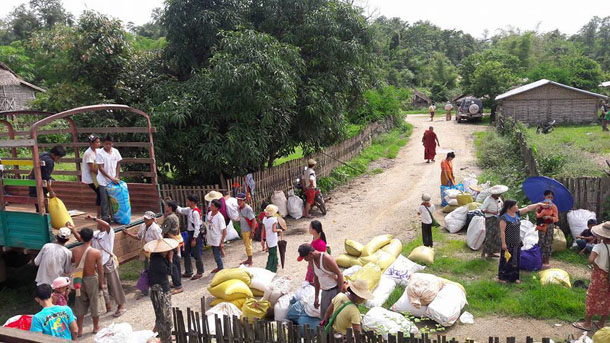The last of over 1,000 ethnic Shan displaced by conflict in northern Shan State’s Hsipaw Township the previous month have now returned to their villages.
On Tuesday, a last group of 300 voluntarily left Hsipaw town, where they had obtained shelter with the aid of community leaders, including a state parliamentarian of the Shan Nationalities League for Democracy (SNLD) and members of the Shan Literature and Culture Committee.
The displaced have returned to the villages of Thein Hain, Nar Thaw and Pan Nar bordering Lashio Township, where fighting between the Burma Army and the Shan State Army-North prompted them to flee starting May 19. The area is now considered conflict free.
Nang San San Aye, an SNLD state parliamentarian for Hsipaw Township, told The Irrawaddy that they had given the returning villagers “18,000 kyats (US$15) per person, along with rice, cooking oil, salt and other commodities for them to eat when they got back to their villages.”
Nang San San Aye said she had overseen the first group sent back on June 1, with subsequent groups sent back on June 6, 13 and 14.
She said that now is the time is for the local Shan to plant paddy in their villages, with the onset of the rainy season across Burma.
According to local community leaders, the SSA-N is no longer in the area where the Shan villagers have returned; only the Burma Army has retained bases in the vicinity, and the fighting has stopped.
Local authorities in Hsipaw Township have also facilitated the handout of citizenship documentation to those displaced, including Citizenship Scrutiny Cards (“pink cards”), before their return. Many had not possessed such documents previously, despite being eligible for citizenship.
Nyo Nyo Myat, another female community leader in Hsipaw assisting the return, said the citizenship documents along with “recommendation letters” from the government would provide “safety” for those returning by “proving they were from those villages.”
“Only the Burma Army remains in their villages now. If [the returning villagers] show their citizenship cards, they will be allowed to stay there,” said Nyo Nyo Myat.
Nang San San Aye of the SNLD explained that, “Many of our ethnic Shan cannot speak Burmese, and Burma Army soldiers beat them because of it. Those [citizenship] cards will prove they belong to the villages.”

















